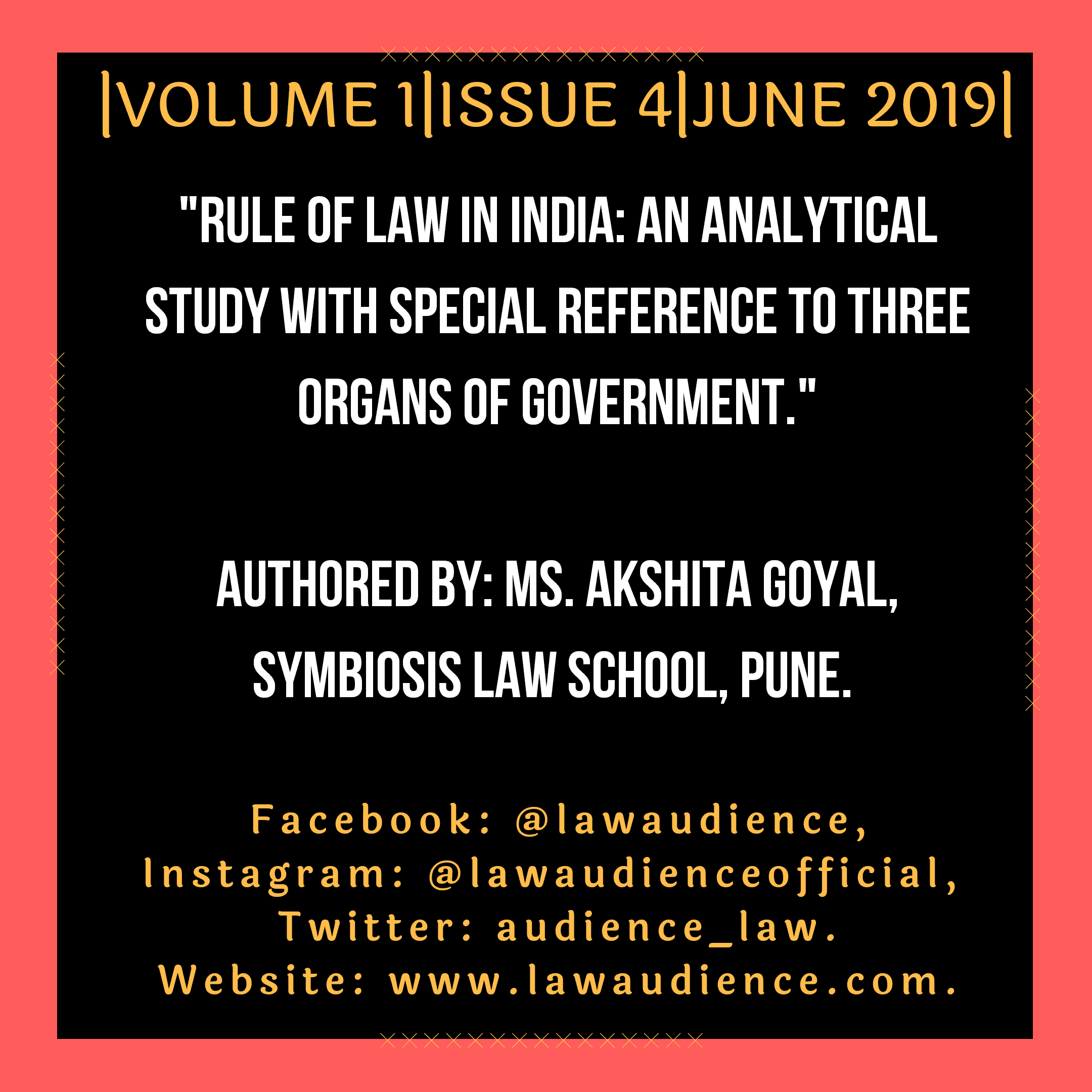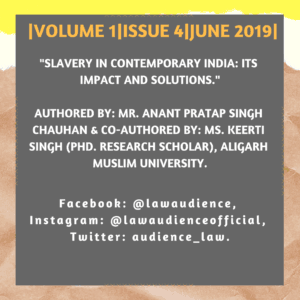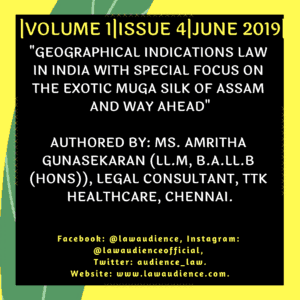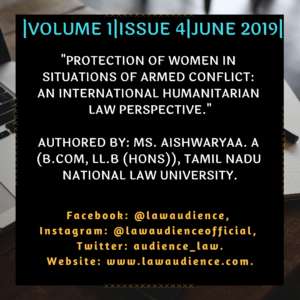Authored By: Ms. Akshita Goyal, Symbiosis Law School, Pune.
I. ABSTRACT:
“Rule of Law as a concept originated all the way back to 1215 in the Magna Carta, a document that is looked up to even now, and exists to guide the path of justice even in 2019. Rule of Law primarily seeks to prevent arbitrariness in decision making. Rule of Law in India can be comprehensively understood through the approach of understanding its application by the three main organs of the government- the legislature, the executive and the judiciary. A plethora of cases that have been adjudged by the Supreme Court lay down the importance of the application of rule of law, even though the same is not explicitly statutorily recognized. The importance of the same has been reiterated to the extent that it is considered as part of the Basic Structure of the Constitution and therefore, cannot be amended by the Parliament at any time, regardless of the majority they hold.
An analysis of the presence of Rule of Law depicts its existence and application in every facet of the Indian government. It can also be inferred that the Supreme Court has been one of the leading advocates of the propagation of Rule of Law. Its international presence and importance also have a mention in the paper. Professor A.V. Dicey’s name comes almost synonymous to Rule of Law and an analysis of the same would be incomplete without his views.”
II. INTRODUCTION AND BACKGROUND:
Rule of Law can be defined as, “The predominance that is absolute of an ordinary law over every citizen regardless of that citizens’ power.”[1] Rule of Law can be traced back to its codification in the Magna Carta in 1215, when English nobles demanded that King John’s powers to arbitrarily arrest be curtailed; however, the formal origin of the phrase can be traced back to Sir Edward Coke, and the French phrase, “la principe da legalite” meaning the principle of legality; a government based on principles of law and not of men. One of the main proponents whose name we associate with the Rule of Law is Professor A.V. Dicey. He came up with three pillars that constitute the concept of Rule of Law, i.e., Supremacy of Law, Equality before Law, and Predominance of Legal Spirit. He famously advocated that the Englishmen don’t need administrative law or any form of written law to keep checks on the government but that the Rule of Law and Natural Law would be enough to ensure the absence of executive arbitrariness.
In India, the origins of the Rule of Law can be traced back to renowned philosophers like Chanakya, who propounded for rule of law in their own way by maintaining that the king should be governed by the word of law. India follows the Common Law system that has its origins in the British jurisprudence the Rule of Law has great prominence. The Constitution makers of India also wanted India to be governed by the Rule of Law. The Apex Court has often dealt with the practical application of it in India.
III. RULE OF LAW IN INDIA:
The concept of Rule of Law in India permeates into the Indian legal system through its Constitution. The Part III (Fundamental Rights) of the Constitution acts as a restraint on the various organs of the government exercising its powers and encroaching upon the others. Although separation of powers is followed in India and contributes to the propagation of Rule of Law, it’s not actually codified anywhere. Each of the organs of the government, Legislature, Executive and Judiciary have contributed to the theoretical and practical application of rule of law. In India, the rule of law implies non-arbitrariness and fairness; it has often been held to be an indispensable part of a democratic country.
IV. RULE OF LAW IN INDIA AND THREE ORGANS OF THE GOVERNMENT:
IV.I LEGISLATURE AND THE RULE OF LAW:
As per Article 13(1) of the Indian Constitution, any law that is made by the legislature has to be in conformity with the Constitutional principles, failing which, it would be considered unconstitutional, and thus, invalid. Rule of Law is undeniably one of the most important constitutional principles in India. Furthermore, Article 14 ensures that all citizens are equal before the law and no one is discriminated on the basis of sex, religion, race or place of birth.
It was also held by the Apex Court of our country that, “A long line of decisions of this Court over the past five decades or so have ruled that arbitrariness has no place in a polity governed by Rule of law and that Article 14 of the Constitution of India strikes at arbitrariness in every State action.”[2] Article 21 which guarantees the right to life and personal liberty also ensures the practical application of Rule of Law because of the words, “procedure established by law” that embody the article. The ambit of this article has been widened ever since the judiciary exercised its power of interpretation of the law as guardian of rights.
Rule of Law in India was also developed by International jurists when they came together for the Delhi Declaration of 1959 and stated that, “The rule of law implies that the functions of the government in a free society should be so exercised as to create conditions in which the dignity of man as an individual is upheld.”[3] Rule of law is often said to be one of the very founding stones of a democratic setup like India.[4] The legislature often delegates its lawmaking powers to the executive sometimes in order to save time and allows experts on the subject to contribute to the lawmaking process. This delegation of powers must be within the ambit of the rule of law- the executive cannot arbitrarily be allowed to make laws.
IV.II JUDICIARY AND THE RULE OF LAW:
The higher judiciary in India has, on multiple occasions, advocated the application of Rule of Law in the daily lives of the common masses. In ADM Jabalpur v. Shivakant Shukla,[5] H.R. Khanna in a dissenting opinion said that, even in the absence of Article 21 of the Indian Constitution, the state has got no power to deprive one of his life or personal liberty and that Rule of Law is the accepted norm of all civilized societies. Though this opinion of Justice H.R. Khanna was not the majority opinion, it is still one that is heavily relied upon by leading jurists of the present time. In another important judgment,[6] it was observed by the Supreme Court of India that, “The central and most characteristic feature is the concept of rule of law which means, in the present context, the authority of law courts to test all administrative action by the standard of legality.”
Similarly, in another case,[7] a Constitution Bench of the Supreme Court, laid down the law in the following terms: “Thus, it is clear that adherence to the rule of equality in public employment is a basic feature of our Constitution and since the Rule of Law is the core of our Constitution, a court would certainly be disabled from passing an order upholding a violation of Article 14 or in ordering the overlooking of the need to comply with the requirements of Article 14 read with Article 16 of the Constitution.” The Apex Court has also reaffirmed its stance and held that India is a country that is committed to egalitarian values and dedicated to the Rule of Law.[8]
Furthermore, a seven-judge bench of the Apex Court reiterated that the silences in the constitution must be imbued with substantive content by infusing them with a meaning which enhances the rule of law.[9] The analysis of rule of law as applied by the Indian judiciary would be incomplete without the mention of the landmark case, Kesavananda Bharati v. State of Kerala,[10] wherein it was held that rule of law forms part of the basic structure of the Indian constitution and that it cannot be easily amended by the parliament. The same was also held in the Indira Nehru Gandhi v. Raj Narain[11] case.
IV.III EXECUTIVE AND THE RULE OF LAW:
The main ingredient of the rule of law as a concept is considered to be non-arbitrariness. It has been held in a Supreme Court case[12] that arbitrariness is the very negation of the rule of law. The question of arbitrary decisions or procedures primarily arises when it comes to executive actions taken by those that enforce laws, like the police officials. In the Maneka Gandhi v. Union of India[13] case, the Apex Court ensured that the exercise of power in an arbitrary manner would not be permitted as the executive must conform to the rule of law. The Court held that the following conditions must be fulfilled before a person is deprived of his life and personal liberty under Article 21;
- That there must be a valid law;
- The law must provide a procedure;
- The procedure must be fair, just and reasonable;
- The law must satisfy the requirement of Articles 14 and 19;
The delegated legislation that gave power to the executive to legislate on behalf of the elected lawmakers should be under the ambit of rule of the law and cannot be unfair in any manner.
Similarly, in another case[14], the Apex Court held that, “It is indeed unthinkable that in a democracy governed by the rule of law the executive Government or any of its officers should possess arbitrary power over the interests of the individual. Every action of the executive Government must be informed with reason and should be free from arbitrariness. That is the very essence of the rule of law and its bare minimal requirement.” The Supreme Court also observed in a case[15] that the absence of arbitrary power is the primary postulate of Rule of Law upon which the whole constitutional edifice is dependent. Discretion being exercised without any rule is a concept which is the antithesis of the concept. Rule of law also requires that the decisions and steps taken must be in an open and transparent way. This seeks to curtail the discretion provided to the executive officials by way of the Common Law. Sir Edward Coke, who formally gave life to the phrase “rule of law”, maintained that the king should be under God and the Law; he established the supremacy of the law against the executive- that there is nothing higher than law.
V. ANALYSIS:
Rule of Law exists in every facet of Indian democracy. The legislature ensures that all of the laws that are made are in line with the basic structure of the constitution, of which, Rule of Law is an essential part. If the legislature makes laws to the contrary then it would be subject to judicial review and could be struck down. The legislature consists of what the common masses refer to as the lawmakers, but what interferes with the application of rule of law is the fact that these lawmakers might also be lawbreakers.
Many political leaders that currently have the power to legislate and vote on pending bills, either have on-going cases lodged against them, are alleged criminals or have a pre-existing criminal record. Handing the immense responsibility of lawmaking to such ministers can indeed interfere with the unbiased and efficient application of Rule of Law as India’s constitution-makers intended.
In light of the authorities cited, it can be inferred that the Supreme Court has been one of the leading advocates of rule of law in India and among the three organs of the government; the judiciary has proved most efficient in ensuring its application in practice.
The judiciary has also used its interpretation to widen the ambit of the rule of law. However, the practical application of the rule of law in India also has certain disadvantages as it can lead to judicial encroachment into the shoes of the legislature and the executive. This would not only interfere with their power to function with sovereignty but also would be a farce under the guise of judicial “activism.” The separation of powers that India prides itself on would also be dismantled.
The main issue with the rule of law, however, is that its practical enforcement cannot be ensured due to the lack of its specific codification. Most of the authority that the rule of law derives arises from the interpretations given by learned judges sitting at the higher judiciary who could often contradict each other’s lines of thought. This could lead to a harsh reality i.e. rule by law, and not rule of law.
The judiciary has still continued to see the good in the advocacy and application of rule of law and in a Supreme Court case,[16] the ratio laid down was that “If the rule of law has to be preserved as the essence of the democracy of which purity of elections is a necessary concomitant, it is the duty of the courts to appreciate the evidence and construe the law in a manner which would subserve this higher purpose and not even imperceptibly facilitate acceptance, much less affirmance, of the falling electoral standards. For democracy to survive, the rule of law must prevail.”
The judiciary has interpreted the rule of law to not only included non-arbitrariness but also due consideration of legitimate expectation.[17] The Apex Court has also said that, “The basic requirement of Article 14 is fairness in action by the State and we find it difficult to accept that the State can be permitted to act otherwise in any field of its activity, irrespective of the nature of its function, when it has the uppermost duty to be governed by the rule of law.”[18]
It can be inferred that the practical application of the rule of law in its best form is necessary for the true functioning of a democracy. Rule of law is also internationally recognized and attempts have been made to codify it in important documents that would prospectively be ratified by most countries, like the Universal Declaration of Human Rights, 1948[19], where it says that human rights should be protected by the rule of law. Non-arbitrariness, fairness, and just procedures must be followed, preferably in a manner that is open and transparent to the common man. This can help ensure that it remains a rule of law, and not the rule of man.
VI. CONCLUSION:
Rule of Law is thus an eternal and significant value of constitutionalism and an inherent attribute of a democratic setup. Its application is necessary not just within countries that proudly follow the common law system, but also universally because arbitrariness must be curtailed in order to ensure justice. This is precisely why the question of the International Rule of Law has now been a burning topic of discussion for present-day eminent jurists.
The need for a concept like Rule of Law has been felt over decades, and it can be traced all the way back to Upanishads in India, wherein it provides that the law is the king of the kings. Thus, the importance given to laws through this theory must imply that equal, if not higher, importance must be placed in ensuring that the lawmakers are qualified to take upon this responsibility.
[1] 10th edition, Black Law’s Dictionary (2014).
[2] State of Punjab and Ors. v. Brijeshwar Singh Chahal and Ors., A.I.R. 2016 S.C. 1629 (India).
[3] Norman S. Marsh, The Rule of Law in a Free Society, International Commission of Jurists (January 5-10, 1959) https://www.icj.org/wp-content/uploads/1959/01/Rule-of-law-in-a-free-society-conference-report-1959-eng.pdf.
[4] Noida Entrepreneurs Association and Ors. v. NOIDA and Ors., A.I.R. 2011 S.C. 2112 (India).
[5] Additional District Magistrate, Jabalpur v. Shivakant Shukla, A.I.R. 1976 S.C. 1207 (India).
[6] Chief Settlement Commr. v. Om Prakash, A.I.R. 1969 S.C. 33 (India).
[7] Secretary, State of Karnataka and Ors. v. Umadevi (3) and Ors., A.I.R. 2006 S.C. 1806 (India).
[8] Ramana Dayaram Shetty v. International Airport Authority of India and Ors., A.I.R. 1979 S.C. 1628 (India).
[9] Krishna Kumar Singh and Ors. v. State of Bihar and Ors., (2017) 3 S.C.C. 1 (India).
[10] Kesavananda Bharati v. State of Kerala, A.I.R. 1973 S.C. 1461 (India).
[11] Indira Nehru Gandhi v. Raj Narain, A.I.R. 1975 S.C. 1590 (India).
[12] Kumari Shrilekha Vidyarthi and Ors. v. State of U.P. and Ors., A.I.R. 1991 S.C. 537 (India).
[13] Maneka Gandhi v. Union of India, A.I.R. 1978 S.C. 597 (India).
[14] Ramana Dayaram Shetty v. International Airport Authority of India and Ors., A.I.R. 1979 S.C. 1628 (India).
[15] Som Raj v. State of Haryana, A.I.R. 1990 S.C. 1176 (India).
[16] Gadakh Yashwantrao Kankarrao v. Balasaheb Vikhe Patil, A.I.R. 1994 S.C. 678 (India).
[17] Lalaram and Ors. v. Jaipur Development Authority and Ors., (2016) 11 S.C.C. 31 (India).
[18] Kumari Shrilekha Vidyarthi and Ors. v. State of U.P. and Ors., A.I.R. 1991 S.C. 537 (India).
[19] UN General Assembly, (1948), Universal Declaration of Human Rights, (217 [III] A), Paris.



